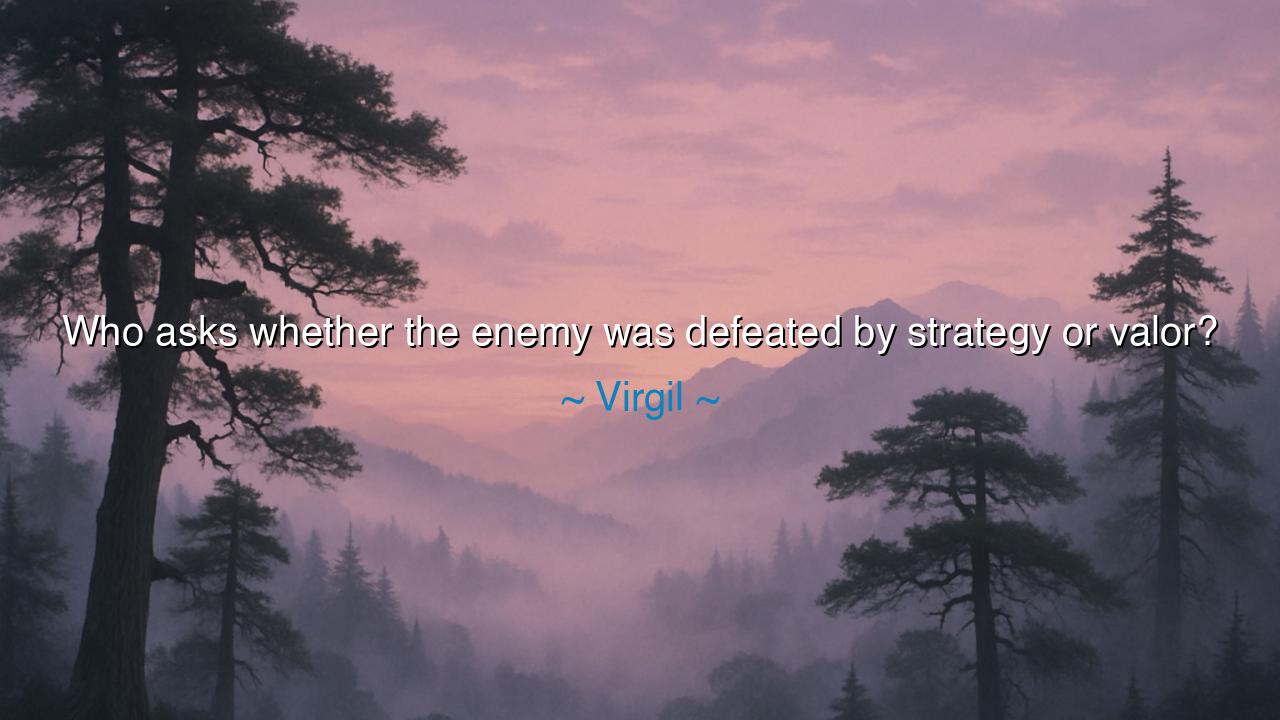
Who asks whether the enemy was defeated by strategy or valor?






“Who asks whether the enemy was defeated by strategy or valor?” — so spoke Virgil, the poet of Rome, whose verses carried not only the grandeur of empire but the whispers of eternal wisdom. In these words, he reminds mankind that victory itself transcends the means by which it is achieved. Whether through cunning or courage, what endures is triumph, and what is forgotten are the quarrels of method. The heart of this saying beats with the rhythm of human striving: the truth that results, born of perseverance and purpose, stand higher than pride in any single virtue.
Virgil, who lived in the shadow of Rome’s wars and the rise of Augustus, knew well the balance between valor — the strength of the sword — and strategy — the wisdom of the mind. In the fields of Troy and the halls of empire, he saw that glory belongs not merely to the brave, but to the wise, and that both courage and cunning are but instruments of fate. When he penned these words, he spoke not only to warriors, but to all who labor in the struggles of life: that no one need boast of how they overcame — only that they did, with honor and resolve.
Consider the tale of Themistocles, the Athenian general, whose city once trembled before the power of Persia. It was not by sheer force that he prevailed, but by the clever ruse of the narrow straits of Salamis, where the mighty Persian fleet was trapped and destroyed. Some mocked his guile, saying true warriors fight in the open field. Yet who now condemns him? History remembers not the debates, but the deliverance of Greece. Themistocles’ strategy, as Virgil’s wisdom foretells, stands eternal proof that victory, once attained, silences the arguments of method.
In the same spirit, even in the quiet wars of peace, the saying endures. A scholar who triumphs over ignorance through diligence and cunning thought achieves no less than the soldier who conquers with steel. A mother who defends her home through patience and foresight displays valor of the heart, no less noble than that of the sword. Thus, the quote whispers to every soul: do not be enslaved by pride in one virtue, for life demands many. Whether by wit or will, the worth lies in enduring — and in prevailing.
Virgil’s question carries also a rebuke to vanity. Too often men boast of how they conquered, seeking praise not for the good achieved but for the manner of their doing. Yet the wise see that the end crowns the effort, not the pride that fuels it. The river of time washes away the names of those who debated, but carves in stone the deeds of those who acted. Let us then remember that to act wisely, bravely, and effectively — not merely to appear noble — is the true path of greatness.
And yet, Virgil’s words are not cold praise of cunning alone. They call for balance, for he who wins without virtue wins only half. Strategy without valor is cowardice; valor without strategy is folly. The greatest souls are those who unite both — who temper fire with foresight, and courage with calculation. The harmony of these forces is the mark of wisdom, the seal of those who rise above chaos and lead others toward light.
So, my children of tomorrow, take this lesson to heart: when you face your battles — be they in war, in work, or within your soul — seek not to be called brave alone, nor clever alone. Seek instead to be victorious in purpose and pure in intent. Whether through reason or resolve, let your triumphs serve the good. Let others debate whether you conquered by strategy or valor; your duty is to conquer rightly.
And when the day is done, remember: the world remembers not the method, but the victory that lifts humanity higher. Therefore, act with both courage and wisdom — the twin wings of triumph — and let your life itself be the answer to Virgil’s immortal question.






AAdministratorAdministrator
Welcome, honored guests. Please leave a comment, we will respond soon